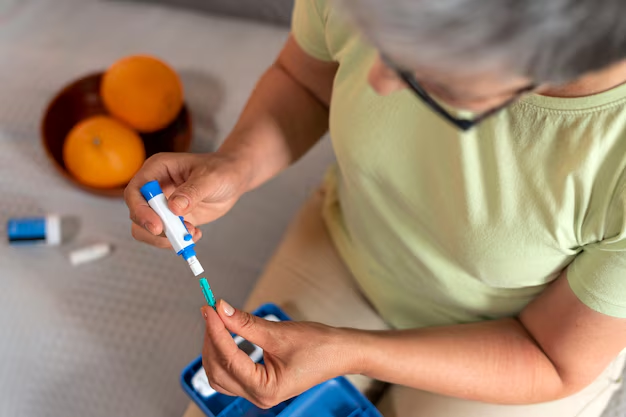Your Guide to Blood Test
What You Get:
Free Guide
Free, helpful information about Diabetes and related Blood Test topics.
Helpful Information
Get clear and easy-to-understand details about Blood Test topics and resources.
Personalized Offers
Answer a few optional questions to receive offers or information related to Diabetes. The survey is optional and not required to access your free guide.
Understanding Blood Tests for Diabetes Management
Living with diabetes involves a thorough understanding of how the body processes sugar, and blood tests are crucial in providing this insight. Knowing the different types of blood tests and their implications can help individuals make informed choices about their health. Let’s explore the key blood tests relevant to diabetes and how they contribute to effective diabetes management.
🌟 Why Blood Tests Matter in Diabetes
Blood tests play a pivotal role in the diagnosis and management of diabetes. They provide a snapshot of your body’s glucose levels and help track the effectiveness of treatment plans. Identifying trends over time can aid in preventing complications associated with high or low blood sugar levels.
Key Reasons Blood Tests Are Essential
- Diagnosing Diabetes: Blood tests are fundamental in diagnosing both type 1 and type 2 diabetes, as well as gestational diabetes.
- Monitoring Treatment: Regular testing helps in adjusting medication, diet, and exercise plans.
- Predicting Complications: Elevated glucose levels are linked with long-term complications such as heart disease and neuropathy. Tests can serve as an early warning system.
🩸 Types of Blood Tests for Diabetes
HbA1c Test
The HbA1c test measures your average blood glucose levels over the past two to three months. It’s a key marker in assessing long-term glucose control.
- What It Shows: A higher HbA1c level indicates poorer blood sugar control, while a lower level suggests better control.
- Why It Matters: It helps gauge the overall effectiveness of a diabetes management plan.
Fasting Blood Sugar Test
A fasting blood sugar test measures the glucose level in your blood after an overnight fast.
- What It Shows: High levels might indicate diabetes or prediabetes.
- Why It Matters: This test helps to understand how well your body controls glucose when not influenced by recent food intake.
Oral Glucose Tolerance Test (OGTT)
An OGTT involves checking blood sugar levels before and after drinking a sweet beverage. It's particularly useful in diagnosing gestational diabetes.
- What It Shows: The body's efficiency in processing glucose over two hours.
- Why It Matters: It’s a critical test for pregnant women to ensure early management of gestational diabetes.
Random Blood Sugar Test
A random blood sugar test measures glucose levels at any time of the day without fasting.
- What It Shows: Indicates how your body handles sugar throughout different parts of the day.
- Why It Matters: It can be a quick indicator of whether more comprehensive testing is needed.
🕒 How Often Should You Test?
The frequency of blood testing depends on the type of diabetes, the treatment plan, and individual health goals.
Type 1 Diabetes
- Regular Monitoring: Daily glucose testing, including before and after meals, is often recommended.
- HbA1c Tests: Usually every 3 months to ensure blood sugar goals are being met.
Type 2 Diabetes
- Less Frequent Monitoring: Depending on medication, some individuals may monitor less frequently.
- HbA1c Tests: Typically every 3 to 6 months. Those with good control might test less frequently.
Gestational Diabetes
- Frequent Testing Required: Often involves multiple tests daily due to rapidly changing requirements during pregnancy.
- HbA1c Tests: Not as common due to the short time frame, but may be used in conjunction with other tests.
🔍 Interpreting Your Results
Understanding test results allows for proper adjustments in lifestyle and treatment. Here’s a quick guide to common targets, though individual goals will vary.
Common HbA1c Targets
- Normal: Below 5.7%
- Prediabetes: 5.7% to 6.4%
- Diabetes: 6.5% or higher
Fasting Blood Sugar Levels
- Normal: 70 to 99 mg/dL
- Prediabetes: 100 to 125 mg/dL
- Diabetes: 126 mg/dL or higher
Random Blood Sugar Levels
- Normal: Less than 140 mg/dL
- Indicative of Diabetes: 200 mg/dL or higher
🧩 The Role of Consistent Monitoring
Regular testing is not only about getting numbers; it’s about understanding patterns and making informed decisions. Consistency in monitoring helps:
- Adapt Dietary Choices: Recognize the impact of different foods on blood glucose.
- Adjust Physical Activity: Identify how exercise influences sugar levels.
- Evaluate Medications: Assess whether current medications are effective or need adjustment.
📈 Visual Summary: Key Takeaways
Here's a concise overview to reinforce the essential points:
💡 Blood Test Types
- HbA1c: Long-term glucose indicator.
- Fasting Blood Sugar: Baseline measure without food influence.
- OGTT: Effectiveness in diabetes diagnosis.
- Random Blood Sugar: Snapshot of glucose control.
⚖️ Testing Frequency
- Type 1: Daily and quarterly HbA1c.
- Type 2: Variable, with focus on long-term markers.
- Gestational: Intensive due to pregnancy impact.
📊 Interpreting Results
- Normal: Specific target ranges for different tests.
- Management: Use results to steer lifestyle and treatment.
👣 Next Steps for Effective Management
Building a solid routine around blood glucose monitoring empowers individuals to take charge of their diabetes. Here are some steps to consider as you manage or support someone with diabetes:
- Stay Informed: Engage with reliable sources and updates in diabetes management.
- Track Data: Maintain a log of your readings to identify trends.
- Consult Regularly: Keep in close communication with healthcare professionals to fine-tune your management plan.
By understanding and utilizing blood tests effectively, individuals with diabetes can lead healthier lives with fewer complications, underscoring the importance of these crucial medical tools.
What You Get:
Free Diabetes Guide
Free, helpful information about Blood Test and related resources.

Helpful Information
Get clear, easy-to-understand details about Blood Test topics.

Optional Personalized Offers
Answer a few optional questions to see offers or information related to Diabetes. Participation is not required to get your free guide.


